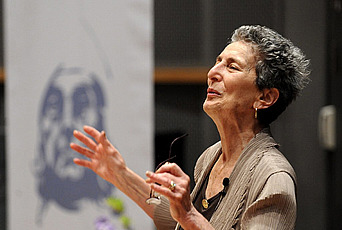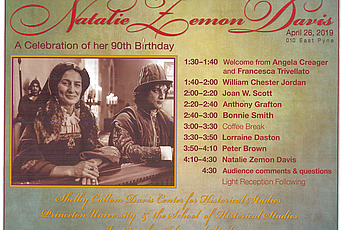Natalie Z. Davis (1928–2023)

Natalie Zemon Davis, one of the pioneering historians of her time and ours, died in Toronto on October 21 at the age of 94. She warrants mention because of her close connections to historians and social scientists—Faculty and Members alike—at the Institute during the many years when she lived in Princeton and because of the foundational influence her work has had on so many of us.
Natalie’s tie to the Institute began in 1957–58 when her husband, Chandler Davis, was a Member in the School of Mathematics. (Chandler died a year ago in September 2022). Then, after teaching briefly at Brown University and the University of Toronto, and for several years at the University of California at Berkeley, Natalie returned to IAS as a Member in the School of Social Science in January 1978. Six months later, she joined the Department of History at Princeton University, where she served until her retirement in 1996. David Nirenberg, who studied with her at Princeton, finds himself “vividly remembering everything she ever said to me, as I am sure do many who learned from her.”
Retirement hardly describes Natalie’s activities after 1996. She was based in Toronto, continuing to teach and write, gracing conferences and seminars with her sparkling insights and luminous presence up to the end of her life. Suzanne Akbari (who came to IAS from the University of Toronto) remembers the interconnectedness of sociality and intellectual/political life in the Davis household: “Their shared commitment to social justice, expressed in sometimes overlapping ways, sometimes distinct, gave the warmth of their household a kind of edge. This was a radical space of kindness and mutual support, where human connection was the driver of hope for a better present and future.”
In 2019, we celebrated Natalie’s 90th birthday with a conference jointly sponsored by the Shelby Cullom Davis Center for Historical Studies at Princeton University (of which she was the second director following Lawrence Stone) and the School of Historical Studies. Francesca Trivellato was one of the organizers of the event. The then SHS Academic Trustee Lorraine Daston, one of the speakers, said: “When I think of my own generation of historians, especially but by no means exclusively those specializing in early modern European history, I can think of no one whose work has been more mind-stretching” than Natalie’s.1 On the same occasion, Joan Scott spoke of Natalie as a “historian of hope.” The theme of hope for better worlds runs through all of her work. Clifford Geertz, with whom Natalie often discussed the interpretation of past cultures, concluded a review of her Trickster Travels: A Sixteenth-Century Muslim Between Worlds by citing her words at the end of that book, words that sum up her long dedication to documenting over and over “the possibility of communication and curiosity in a world divided by violence."2
It is impossible in a short piece to take the full measure of Natalie Davis’s brilliant and original contributions. Readers interested in more details can find them in the obituary published by The New York Times.3 We want to emphasize just a few: her early insistence that women’s history could not be a separate field of study and that gender—the relations between women and men as socially constructed and historically variable—had to be the object of inquiry; her willingness to speculate about human motives on the basis of incomplete archival documentation (in The Return of Martin Guerre, the film (1982) and the book (1983), but also in Fiction in the Archives, a study of how ordinary people crafted tales that would successfully appeal to legal authority); her rejection of simplistic assumptions about the religious or material determinants of collective action coupled with her ability to summon up vivid images of people acting courageously in bread riots or charivari (Society and Culture in Early Modern France); her imaginative creation of intimate conversations with figures long passed (Women on the Margins). At the time of her death, Natalie was putting the final touches to a book that bears all of her hallmarks while it pushes the boundaries of her work yet again: Braided Histories, anticipated in a few talks and articles, dissects the experience of European plantation owners—both Christian and Jewish—and enslaved people of African descent in the Dutch colony of Surinam, in South America. And through it all her richly textured voice, thrilling to her subjects and calling us to share that thrill with her. There was pleasure, irony, deep compassion and understanding in all she wrote. A compassion that extended to her colleagues and students, about whom Natalie rarely had a mean word to say.
One of the themes that echoes through the tributes to her is one both of us expressed when we got the sad news of her death. “I thought she would live forever,” we told each other. David Nirenberg says he considered her “the incarnation of immortal energy.” And the French historian Michelle Perrot, her contemporary and long-time collaborator in advancing the fields of social and cultural history and in insisting on the legitimacy of women’s history, tells us: “I think of her passing with melancholy, gratitude, and a profound admiration for this pioneer, whose vital contributions will exist forever.”
1. The video of the event and the full text of all presentations are available at: https://www.ias.edu/news/in-the-media/essays-natalie-zemon-davis-90th
2. Clifford Geertz, “Among the Infidels,” New York Review of Books, March 23, 2006.


